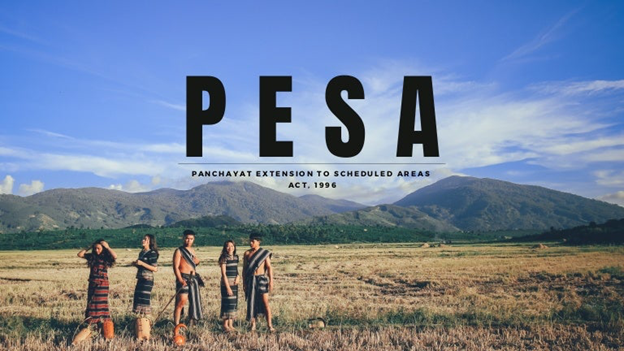Context
Aam Aadmi Party (AAP) declared a six-point “guarantee” for tribals in Gujarat’s Chhota Udepur district, including the “strict implementation” of The Panchayats (Extension to the Scheduled Areas) Act (PESA Act).

Background
- The 73rd and the 74th Amendments to the Indian Constitution passed in 1992 took the three-tier Panchayati Raj governance structure to rural and urban parts of the country and came into force in April 1993.
- However, scheduled areas, predominantly inhabited by the tribal population, were exempted from the new amendments.
- Given low human development indicators, there was a huge demand to empower local governance in the scheduled area as well.
- Thus, the government of India constituted a committee in 1994 to look into the need for such law and modalities and how it can be extended.
- The committee highlighted the plight of the tribal communities and the exploitation they faced and submitted its recommendations in 1995.
About PESA Act, 1996
- The Parliament enacted a special legislation called Panchayat (Extension to Scheduled Areas) Act (PESA) in 1996 and came into force on 24th December 1996.
- The PESA Act was enacted to provide for the extension of the provisions of Part IX of the Constitution relating to the Panchayats to the Scheduled Areas”.
- Other than Panchayats, Part IX, comprising Articles 243-243ZT of the Constitution, contains provisions relating to Municipalities and Cooperative Societies.
- Under the PESA Act, Scheduled Areas are those referred to in Article 244(1), which says that the provisions of the Fifth Schedule shall apply to the Scheduled Areas and Scheduled Tribes in states other than Assam, Meghalaya, Tripura, and Mizoram.
- The Fifth Schedule provides for a range of special provisions for these areas.
- It is now applicable in the Fifth Schedule areas, which deals with the administration of the districts dominated by the tribal communities, and is in force in 10 states of the country.
- These states include Jharkhand, Chhattisgarh, Odisha, Andhra Pradesh, Gujarat, Himachal Pradesh, Madhya Pradesh, Maharashtra, Rajasthan and Telangana.
What is the issue in Gujarat?
- Gujarat notified the State PESA Rules in January 2017, and made them applicable in 4,503 gram sabhas under 2,584 village panchayats in 50 tribal talukas in eight districts of the state.
- At an event held in the tribal district of Chhota Udepur in December 2020, then Chief Minister hailed the Act as the “golden period of tribal development”, promising a separate security force for the Gram Sabhas that would have “complete power to decide their issues”.
- However, while the provisions of the law deem the Gram Sabhas as “most competent” to deal with matters related to their territories for safeguarding their customs, traditions as well as the natural resources in the tribal areas, the Act has not been enforced in letter and spirit.
- Advocate Bhushan Oza, who has been representing tribal groups in their petitions pending before authorities and courts with respect to the tribal rights, says that the implementation of the Act is in contrast to what it promises.
- Despite section 4(a) and 4(d) stating explicitly that the government cannot make any law at the state level or the Central level in matters concerning the tribal areas.
- Tribals have never been taken into confidence before their lands are acquired or projects planned in their places of habitat.
- The PESA Act is rooted in the cultural and traditional practices of the tribal community, and vests ultimate power to the Gram Sabha to make administrative decisions. But that is not the ground reality.
